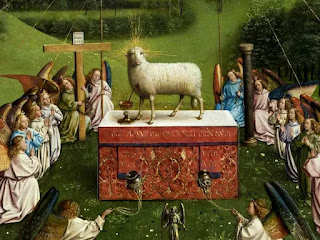Cranmerian Holy Communion during Advent: Sacrament, Gloria, and Eschaton
Alpha and Omega,
To whom shall bow
All nations at the doom,
Is with us now.
The ancient eucharistic anthem from the 7th century Antiphonary of Bangor captures the eschatological aspect of the holy Sacrament. Rowan Williams quotes it when he describes how through the sacrament Christians "stand at or beyond the end of the ages ... [and] become, unevenly and fleetingly but truly signs of the end, bearers of hope and judgement". We might detect here an echo of the great Alexander Schmemann and his account of the Eucharist: "we have entered the Eschaton, and are not standing beyond time and space". As Schmemann also says elsewhere:
The Kingdom is still to come, and yet the Kingdom that is to come is already in the midst of us. The Kingdom is not only something promised, it is something of which we can taste here and now.
And what does this rich teaching have to do with Cranmerian Holy Communion? One of the most distinctive features of the family of Cranmerian Eucharistic rites is the placing of the Gloria at the conclusion, after reception of the holy Sacrament. Even those rites influenced by Anglo-catholic thought - for example, PECUSA 1928 and Scotland 1929 - abandon 1549 and remain with 1552 in terms of the placing of the Gloria.
Now, yes, there was, as Torrance Kirby has indicated, a thoroughly Reformed eucharistic theology at work in Cranmer's decision to move the Gloria to the conclusion of 1552. This, however, is not the only aspect of Cranmer's placing of the Gloria. It also demonstrates how such a Reformed eucharistic theology gave rise to a powerful expression of the eschatological nature of the sacrament. To quote Kirby on Vermigli and his influence on Cranmer:
According to Vermigli’s theology of “instrumental realism” participants in the eucharist would be enabled to "sing the song of the angels" only after they had "participated" the body and blood of Christ, hence the liturgical repositioning of the Gloria.
Our true feeding on Christ in the holy Sacrament is a foretaste of the eschaton, of all things made new, of all things caught up in Christ. Then is "said or sung" the Gloria, as we rejoice with the angelic hosts in creation made new.
Not only does this give to the Gloria a theological meaning very much absent from its placing at the outset of the Eucharist, it also explains why it is said throughout the year, not just on Sundays and high feasts: each time we receive "these holy mysteries" we "stand at or beyond the end of the ages". And so each time we rightly say or sing, "Glory be to God on high, and in earth peace, good will towards men. We praise thee, we bless thee, we worship thee, we glorify thee".
This short series on how aspects of Cranmerian Holy Communion has a particular meaning and resonance during Advent has sought to demonstrate how these provide a much richer theological understanding of the season than can often be found in the provision and ceremonies now commonly used in Anglican liturgies. It is only fitting, therefore, that we conclude with the placing of the Gloria in Cranmerian Holy Communion. Nothing in the Anglican liturgical tradition quite so powerfully captures the relationship between the holy Sacrament and the eschaton, drawing us to discern that by our true feeding on the Lord's Body and Blood "we have entered the Eschaton".

Comments
Post a Comment